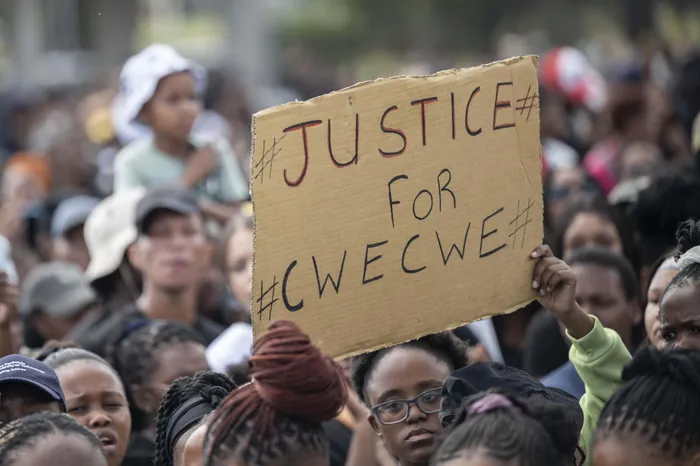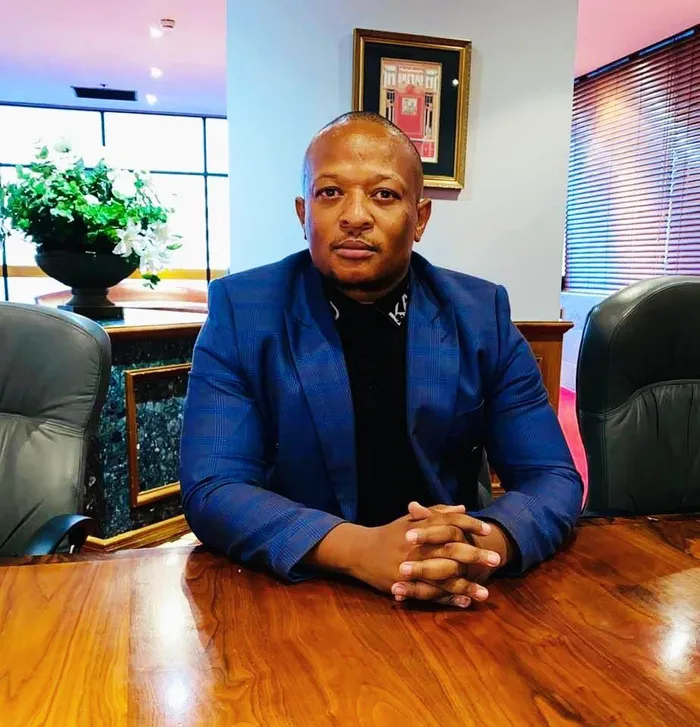This government has failed women and children, and no amount of PR can sanitise that
Opinion

In a powerful display of solidarity, South Africans marched to the Western Cape Education Department to support 7-year-old Cwecwe and call for swift intervention from law enforcement recently.
Image: Armand Hough / Independent Newspapers
Sifiso Mahlangu, Editor of The Star
In South Africa, the ongoing epidemic of gender-based violence (GBV), rape, and femicide has reached an alarming scale.
Despite years of public outcry and numerous initiatives, the South African government continues to fail women, children, and girls in particular. The tragic story of Cwecwe, a young girl from the Eastern Cape who was raped, has become a symbol of the systemic failures of the state, policing, and agencies of justice.
The Justice for Cwecwe movement, which emerged following her ordeal, has shone a harsh light on the incompetence and indifference of these institutions.
The failure of the state to protect vulnerable women and children is not an isolated incident. It reflects a larger crisis of governance, law enforcement, and social support systems in South Africa. Women, children, and girls across the country are suffering daily from violence, and the state’s inability to offer adequate protection has created a climate of fear and insecurity. Despite the passing of progressive laws and policies aimed at curbing GBV, the reality on the ground tells a very different story. The government’s empty promises and the sluggish pace of reforms have done little to stem the tide of violence.
The SAPS, which is tasked with ensuring the safety of citizens, has proven itself both incapable and, at times, complicit in perpetuating this violence. Police officers often fail to respond promptly to distress calls, mishandle evidence, and, in some cases, even ignore victims of GBV.
The judicial system, too, has shown repeated failures in holding perpetrators accountable. Many women and girls who courageously come forward to report their abusers are met with a justice system that is overburdened, under-resourced, and plagued by delays. Perpetrators of violence are frequently granted bail or worse, are allowed to walk free without being convicted. This only perpetuates a cycle of violence, where survivors are left traumatized and unheard, while offenders are emboldened to continue their abuse.
The emergence of the Justice for Cwecwe movement has exposed the depth of this institutional failure. The movement has raised awareness about the inefficiencies of the state and its agencies, demanding that the voices of the victims be heard and that the government finally take decisive action. Through the mobilisation of communities and social media platforms, the movement has highlighted the dire need for a justice system that holds perpetrators accountable and provides proper support for survivors.
One of the most striking responses to the growing crisis has been Independent Media’s ‘Don’t Look Away’ campaign. To address the epidemic of femicide and GBV, The Star has committed to publishing the names of 30 women and girls who have been victims of violence, rape, and femicide. The campaign’s power lies in its ability to humanize these victims and demand accountability from the authorities. These names represent more than just statistics—they are mothers, daughters, sisters, and friends who have been denied the right to live free from fear.
Among the names published by The Star, we see the heartbreaking loss of:
Cwecwe – raped in the Eastern Cape
Uyinene Mrwetyana – Brutally murdered in 2019
Tshegofatso Pule – Pregnant woman killed in 2020
Zoliswa Nkohla – A victim in Cape Town
Karabo Mokoena – A young woman murdered by her boyfriend
Anene Booysen – Raped and murdered in 2013
Senzo Meyiwa’s sister, Nosicelo Meyiwa – A victim of gender-based violence
Patience Nyangulu – Raped and murdered in 2022
Precious Khethiwe – A victim in Limpopo
Relebogile Modise – Murdered in 2019
Bulelwa Soga – Killed by her partner in 2021
Bongiwe Mbatha – Raped and murdered in 2020
Amogelang Maphuthi – A 16-year-old girl killed in 2022
Mphumzi Mkhwanazi – Raped and murdered in 2021
Lungile Mkhize – Shot dead by her partner in 2022
Zinhle Jiyane – Killed in 2021
Mimi Mthunzi – Raped and murdered in 2021
Tebogo Mosia – A victim of femicide in 2021
Lindiwe Mncube – Killed by her partner in 2021
Thabiso Dhlomo – Murdered in 2021
Thandeka Xaba – Shot and killed in 2022
Rebekah Ndlovu – A victim of femicide in 2020
Shannon van Zyl – Raped and murdered in 2019
Ntombikayise Mzini – Killed by her partner in 2021
Nomvula Ndaba – Murdered in 2021
Kholiwe Mthethwa – A victim of rape and murder
Lindokuhle Khoza – killed by a family member in 2020
Zanele Hlatshwayo – A 23-year-old girl raped and murdered in 2020
Mpho Hlongwane – Victim of domestic violence in 2020
Thuli Dlamini – Killed in 2022
Each of these names represents a person who deserved a life of dignity, respect, and safety, yet their lives were stolen by a society that continues to fail them. The government's repeated inaction, the incompetence of the police, and the failures within the judicial system have allowed these atrocities to persist. The Star’s campaign to "Say Her Name" is a powerful reminder that these victims are not statistics—they are real people whose lives were tragically cut short by violence.
As the Justice for Cwecwe movement and other activists continue to demand justice and accountability, it is clear that the South African government must do more than issue empty statements.
Real change is needed, starting with better protection for women and children, more efficient law enforcement, and a justice system that serves and protects all citizens. Until these changes are made, the cries of "Say Her Name" will continue to echo, demanding the recognition and justice that every victim of GBV, rape, and femicide so rightfully deserves.
Many cases of gender-based violence are never even reported, as victims fear further victimization or simply do not trust the authorities. Rape, assault, and femicide are rampant, yet the statistics likely only scratch the surface, as many crimes go unreported or unnoticed. The Justice for Cwecwe movement highlights how these abuses are allowed to continue unchecked, as survivors and victims are neglected by the very institutions that should protect them.
The tragic events surrounding the investigation into Cwecwe’s rape ordeal have raised serious questions about those in power. Senzo Mchunu, the Minister of Police, misled the public by stating that DNA samples from the principal had been taken, only for it later to be revealed that no such action had occurred.
Why would Mchunu, in a moment of public distress, make such a misleading statement? It is difficult not to conclude that there are deeper issues at play, perhaps a deliberate attempt to downplay the gravity of the situation or to protect certain individuals. The fact that Afriforum, a right-wing “whites first” organisation, has defended the suspect is also deeply concerning (but perhaps not unexpected).
Furthermore, the remarks made by Minister Sindisiwe Chikunga, suggesting that the rape may not have been for the first time, was equally troubling. Was this statement based on verified facts? Were these facts authenticated by the police through its child protection unit, or was the minister just seeking some limelight after being demoted from being Transport Minister to the directionless Department of Women and Children?
It certainly seems like the government is trying to protect someone, and that, quite frankly, wouldn’t be the first time.
Cwecwe, say her name!

Sifiso Mahlangu, Editor of The Star
Image: Supplied